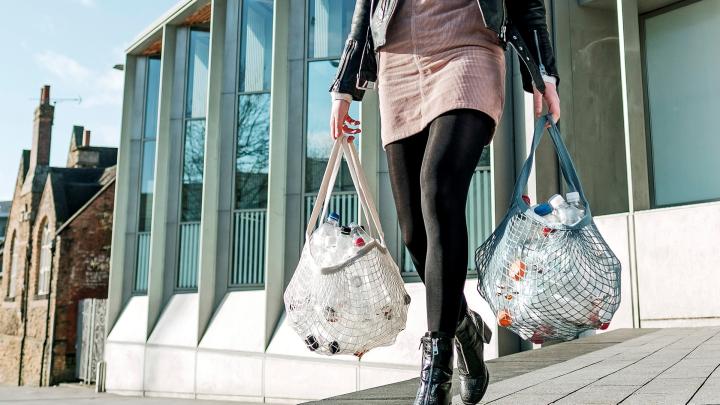It’s almost impossible to imagine a world without plastic.
It’s in the products we use to get ready each morning. It’s in the coffee to-go cup we purchase during our hectic commute. It’s in the carrier bags we use to pick up our groceries at the end of a busy day. But how many of us stop to think about the impact our daily routine has on the planet?
Here at Walgreens Boots Alliance, we are committed to promoting a healthy planet and doing our part to be responsible stewards of the environment. Learn about some of the steps our divisions are taking in their mission to become more sustainable.
That’s a WRAP
From as early as the Victorian era, Boots has been committed to operating as a responsible business. In the 1880s, its perfumes, soaps and bath crystals were often packaged in reusable glass bottles, stoneware pots and metal tins to help reduce the need for new packaging.
Today this legacy remains the same. From 2017, Boots became one of the first pharmacy, health and beauty retailers to stop the manufacturing and sale of rinse-off personal care products containing plastic microbeads. Additionally, the company signed the UK Plastics Pact led by WRAP, pledging to take action against problematic or unnecessary single-use plastics.
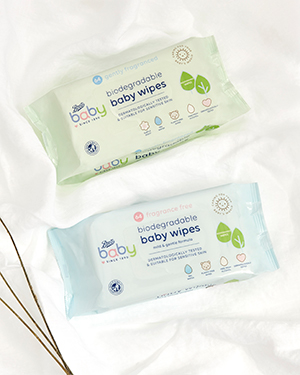 WBA is also leading by example within our Global Brands function, which is focused on bringing purpose-driven brands to life across the world. In September 2019, Liz Earle launched its CICA Restore Skin Paste, which is packaged in a fully recyclable aluminium tube and card carton, and Boots has an owned-brand range of biodegradable and plastic-free baby, face and hand wipes, which are set to remove at least 200 metrics tonnes of plastic per year.
WBA is also leading by example within our Global Brands function, which is focused on bringing purpose-driven brands to life across the world. In September 2019, Liz Earle launched its CICA Restore Skin Paste, which is packaged in a fully recyclable aluminium tube and card carton, and Boots has an owned-brand range of biodegradable and plastic-free baby, face and hand wipes, which are set to remove at least 200 metrics tonnes of plastic per year.
For eco-conscious shoppers looking to replace their bathroom products with sustainable alternatives, Boots owned-brand cotton buds (swabs) have transitioned from plastic to rolled paper, and its affordable range of feminine hygiene products now uses 40 percent less plastic in the outer wrapping of its sanitary towels. Also designed to reduce the impact on the environment even further, its 97% plant-based applicator compact tampons avoid the use of fossil fuels in the manufacturing process.
Bottle it up
A recent survey by UK market research company, OnePoll, showed that 7.7 billion plastic water bottles are being used each year in the UK – a number Boots UK aims to reduce through the innovative “Rehydration Station” at its revolutionary Covent Garden, Sheffield Meadowhall and Bicester Shopping Park stores. Customers can use the station to fill up their own water bottle, or pick up a “bottle for life” and refill it free of charge. Between June 2019 and July 2020, customers have helped save more than 34,000 plastic bottles at the Covent Garden store alone.
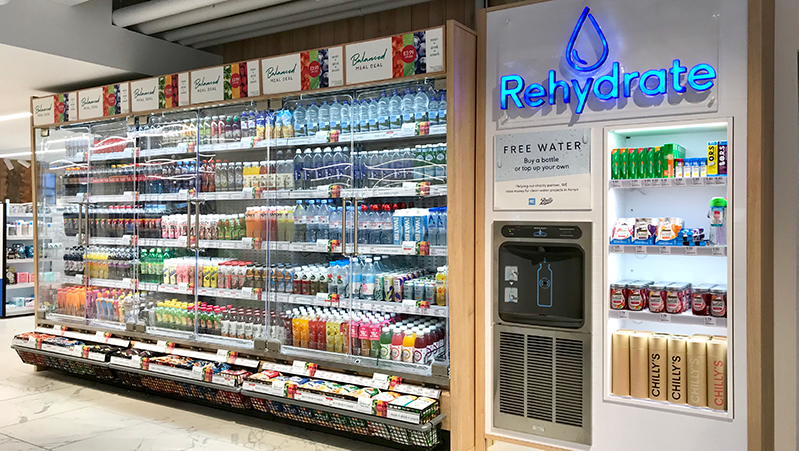
But why stop at water?
Earlier this year, Boots became one of the first retailers to bring tights made from plastic bottles to the high street. Each pair of sustainable tights are made from around four plastic bottles, which are shredded into micro-particles, melted down and spun into yarn. The yarn is then knitted to produce comfortable and durable tights that stand the test of time and use no nylon - a fantastic example of green technology.
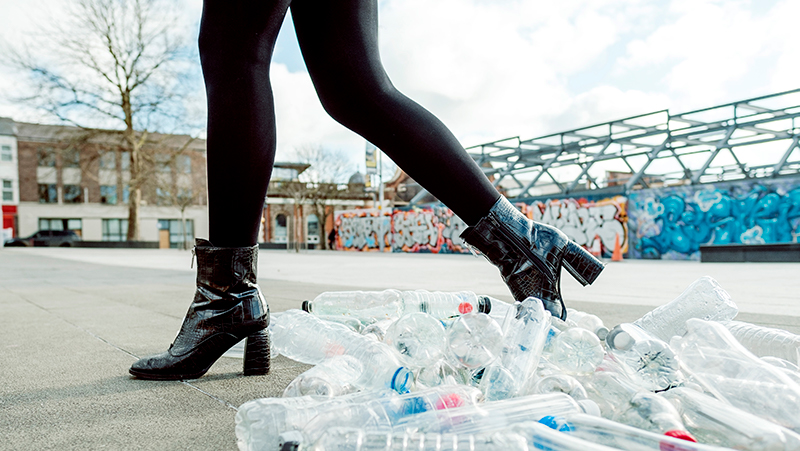
Bin there, done that
WBA's effort to reducing single-use plastic extends beyond what the customer might see. Alliance Healthcare UK has recently announced the replacement of single-use plastic bags and cardboard boxes with a new reusable tote bins. The bins are being used in two different sizes, and have been designed to take the place of almost any situation where a disposable bag or box would have been used.
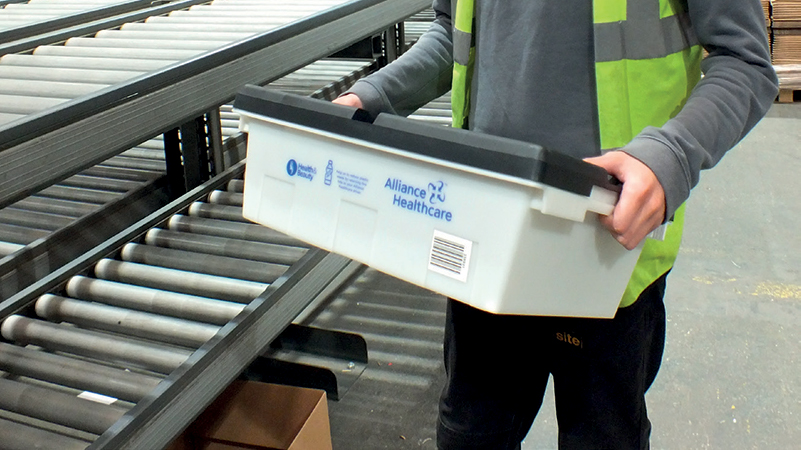
The tote bins, which feature Alliance Healthcare UK branding along with a new health and beauty icon, will be easy for customers to identify, help consolidate orders to streamline deliveries and, most importantly, are estimated to reduce Alliance Healthcare’s single-use material consumption by 2 million units each year in the UK.
It’s in the bag
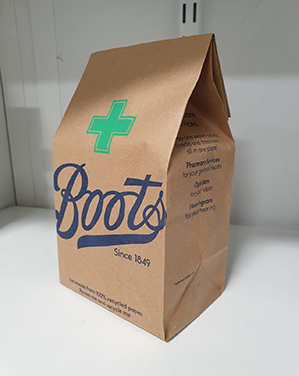 In 2019, Boots became the first national pharmacy, health and beauty retailer in the UK to replace its plastic bags with unbleached (brown) paper carrier bags as the standard option.
In 2019, Boots became the first national pharmacy, health and beauty retailer in the UK to replace its plastic bags with unbleached (brown) paper carrier bags as the standard option.
Now when customers visit the checkout, they’re greeted with a bag made from Forest Stewardship Council (FSC)-certified recycled brown paper that’s printed with water-based ink. To make it even easier to recycle the bag when they get home, each bag also displays the on-pack recycling label.
Not only has this milestone helped remove more than 900 metrics tons of plastic from Boots store operations in the first year, but £129,928.475 has been raised for Boots UK’s long-term charity partner, BBC Children in Need, from any profits of the brown paper bags.
Boots UK’s local pharmacies are also prescribing a more sustainable future. Patients can now receive their medicines in brown paper bags when they collect their prescriptions in store, and as of March 2020, the more than 10 million Boots prescription bags sent from its Dispensing Support Pharmacy in Preston, England each year, are now made using 100 percent compostable material.
For those who prefer to shop online, Boots has also reduced the plastic packaging used in its Boots.com deliveries by 76 percent, which is expected to save 136 tonnes of plastic every year. Boots aims to be 100 percent plastic free in its online deliveries by the end of 2021, continuing to support WBA’s mission to become more sustainable.
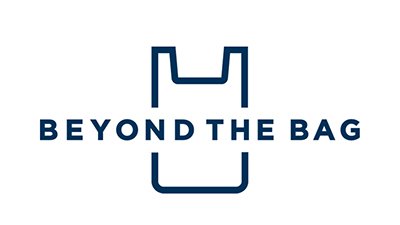
And Walgreens announced this month that they have joined the Beyond the Bag Initiative, a ground-breaking consortium, along with other leading retailers, that aims to reinvent the single-use plastic retail bag. The consortium, led by Center for the Circular Economy at Closed Loop Partners, will find, test, and eventually implement viable alternatives to plastic bags, soliciting innovative design solutions from around the world through the Consortium’s global Innovation Challenge, with an initial focus on implementation in the United States.
While it still may be difficult to imagine a completely plastic-free world, at Walgreens Boots Alliance, it’s getting a little bit more possible every day.

